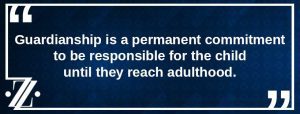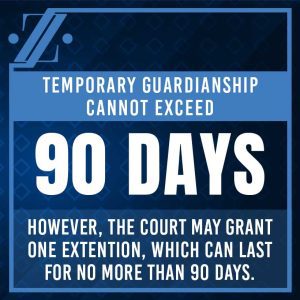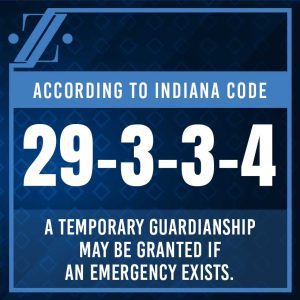Guardianship Attorneys in Indianapolis
Guardianships over minors are judicially appointed relationships between a responsible adult and a child, and they typically occur when the child does not

At Zentz Law, our Indianapolis family law and child custody lawyers are well-versed in guardianship laws and are here to help. If you need assistance with a guardianship case, please don’t hesitate to contact us and set up a free consultation with one of our attorneys for guardianship – 317-220-6056.
What is Guardianship?


While the goal with some guardianships is to eventually reunify the child with their parents, guardianship is a permanent commitment to be responsible for the child until they reach adulthood. If the child does not have parents, or if being with their parents would be unsafe, then guardianship may be a better option that is in the child’s best interests.
Indiana Child Guardianship Laws
While anyone who is an adult of sound mind could become a legal guardian, guardians are traditionally relatives or close family friends who the child is familiar with. There are some situations where the court may appoint someone to be a guardian if the parents are unable or unwilling to provide care for their child or when parental rights have been terminated.


- both of the child’s parents are deceased;
- the parents were divorced, but one of the parents is now deceased;
- the child’s parents remain married to each other;
- the child was born to unmarried parents and paternity has not been established in a court case; or
- the child has been found to be a CHINS because the Department of Child Services has filed a CHINS case and the CHINS case remains open, the Judge may appoint a legal guardian as a permanency plan for the child.
Guardians may appoint someone else to succeed them as guardians in the event of death or if they become incapacitated and unable to care for the child. However, the successor guardian must still be approved by the court.
Indiana law does not allow a Judge to appoint a guardian for a child if there is already a divorce case or a paternity case about the child. If the child’s parents are divorced, only the divorce court has the authority to make court orders about the child’s custody until the child is at least nineteen years old. This is true even after the parents have been divorced. A nonparent who wants “guardianship” of the child must file a petition in the court case for the parents’ divorce requesting to be appointed the child’s “third party custodian.”
Indiana law prevents the Judge from appointing a non-parent as legal guardian for a child if the non-parent has been convicted of one of the following felonies:
- child molesting;
- sexual misconduct with a minor;
- rape;
- criminal deviate conduct;
- vicarious sexual gratification; or
- attempt or conspiracy to commit one of the above crimes.

How to Obtain Guardianship of a Minor in Indiana
Indiana law prefers that a child remain with their parents if possible. However, the law also recognizes that guardianship may be the better option if it is in the child’s best interests. To obtain guardianship, you must show that the parents are unable to provide suitable care and support for the child.


- The child demonstrates a strong attachment to the prospective guardian
- The prospective guardian displays a strong commitment to caring permanently for the child
- The prospective guardian can provide a safe home for the child
- The prospective guardian has demonstrated the ability to provide for the child’s mental, physical, emotional, and educational needs
- The prospective guardian has already established a loving, nurturing, and stable relationship with the child or the child’s family
- The child has indicated their desire to continue a relationship with the prospective guardian
The Legal Duties of a Guardian


If a non-parent has been appointed legal guardian for a child, the non-parent will have the legal authority to obtain medical care for the child, enroll the child in school, and apply for financial benefits for the child, including Social Security, child support, health insurance (including health insurance from the guardian’s employer, depending on the employer’s insurance policy), Supplemental Security Income, and Veteran’s Administration benefits.
In other words, you are responsible for ensuring the support, safety, and well-being of the minor, including all necessary medical and physical needs, such as clothing, food, and shelter. You are also responsible for the social and educational needs of the child, and you may even be able to request child support from the birth parents on behalf of the child.
Guardianship Modification
Just as child custody agreements can be changed, so too can guardianships, as guardianships give a person legal custody over a child. If circumstances change after guardianship has been granted, a petition must be filed with the court to request modification.

When you file a petition to have a guardianship modified, you must present your reason for doing so. The court will then set a hearing so you can submit your testimony along with any other evidence to support the modification request. The judge will then decide what action they believe is appropriate.
If the appointed guardian becomes unwilling or unable to care for the child, the guardian must obtain the Judge’s permission to resign as legal guardian. If the guardian has been appointed guardian of the child’s estate, the guardian must file court documents accounting for the use of the child’s money, real estate, or other assets. A guardian for the child’s estate will need to be represented by a guardianship attorney who will assist with filing the correct court documents.
Indiana Temporary Guardianship Laws


- A guardian has not been appointed for a minor
- An emergency exists
- The welfare of the minor requires immediate action
- No other person appears to have the authority to act in the circumstances
Temporary guardianship cannot exceed 90 days. However, the court may grant one extension, which can last for no more than 90 days. After such time, if the parents are still unable to care for the child, then a permanent guardian will need to be appointed.
Zentz Law – Guardianship Attorneys in Indianapolis
As an Indiana family law and child custody law firm, we have the experience to help you navigate the complex process of obtaining legal guardianship for a minor child as well as legal guardianship for adults. Call 317-220-6056 or email us to schedule a free, no-obligation consultation with top-rated Indiana guardianship attorneys.
***Please note: This page is not intended to give specific legal advice but is meant for information purposes only. Contact us to discuss your case***


